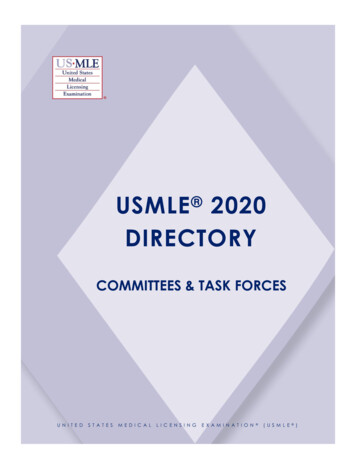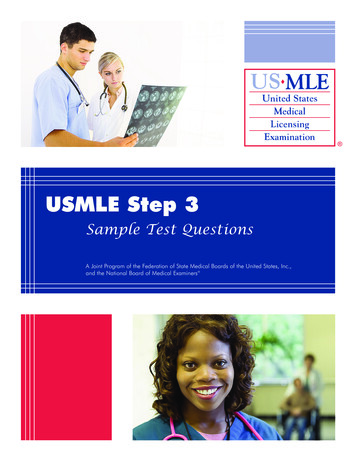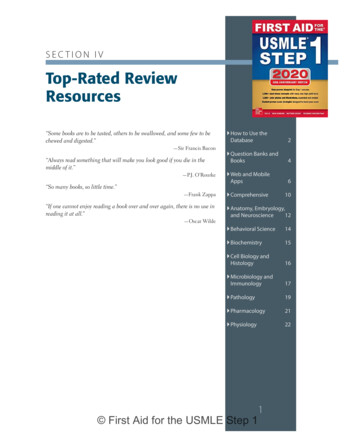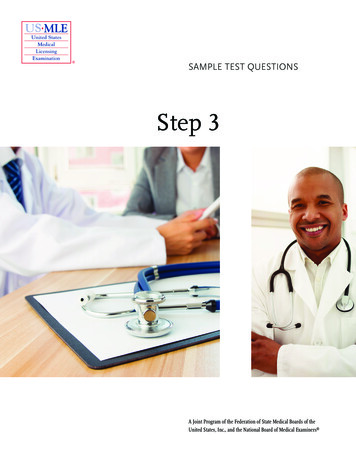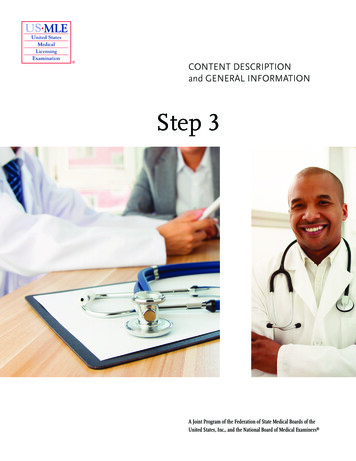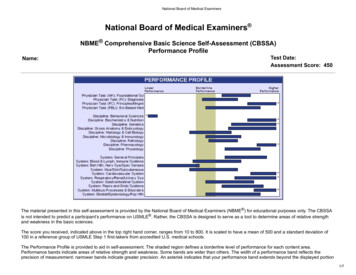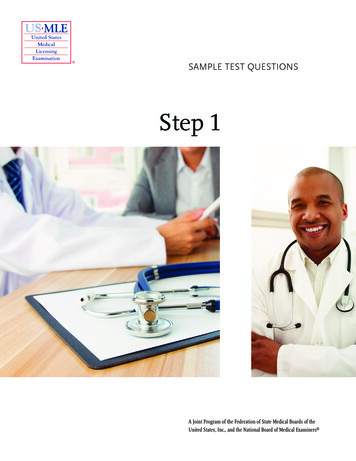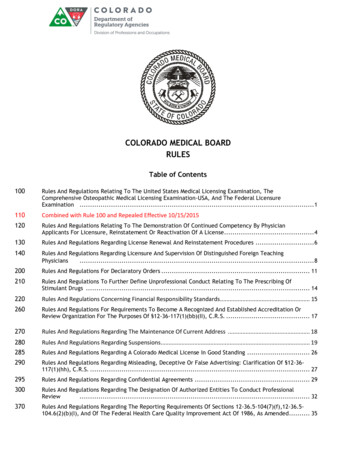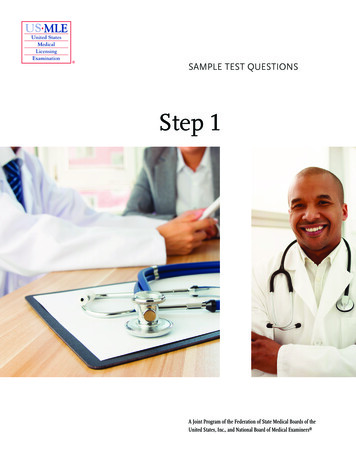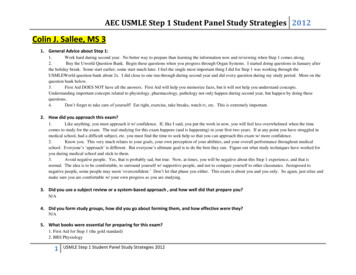
Transcription
AEC USMLE Step 1 Student Panel Study Strategies 2012Colin J. Sallee, MS 31. General Advice about Step 1:1.Work hard during second year. No better way to prepare than learning the information now and reviewing when Step 1 comes along.2.Buy the Uworld Question Bank. Begin these questions when you progress through Organ Systems. I started doing questions in January afterthe holiday break. Some start earlier, some start much later. I feel the single most important thing I did for Step 1 was working through theUSMLEWorld question bank about 2x. I did close to one run-through during second year and did every question during my study period. More on thequestion bank below.3.First Aid DOES NOT have all the answers. First Aid will help you memorize facts, but it will not help you understand concepts.Understanding important concepts related to physiology, pharmacology, pathology not only happen during second year, but happen by doing thesequestions.4.Don’t forget to take care of yourself! Eat right, exercise, take breaks, watch tv, etc. This is extremely important.2. How did you approach this exam?1.Like anything, you must approach it w/ confidence. If, like I said, you put the work in now, you will feel less overwhelmed when the timecomes to study for the exam. The real studying for this exam happens (and is happening) in your first two years. If at any point you have struggled inmedical school, had a difficult subject, etc. you must find the time to seek help so that you can approach this exam w/ more confidence.2.Know you. This very much relates to your goals, your own perception of your abilities, and your overall performance throughout medicalschool. Everyone’s ‘approach’ is different. But everyone’s ultimate goal is to do the best they can. Figure out what study techniques have worked foryou during medical school and stick to them.3.Avoid negative people. Yes, that is probably sad, but true. Now, at times, you will be negative about this Step 1 experience, and that isnormal. The idea is to be comfortable, to surround yourself w/ supportive people, and not to compare yourself to other classmates. Juxtaposed tonegative people, some people may seem ‘overconfident.’ Don’t let that phase you either. This exam is about you and you only. So again, just relax andmake sure you are comfortable w/ your own progress as you are studying.3. Did you use a subject review or a system-based approach , and how well did that prepare you?N/A4. Did you form study groups, how did you go about forming them, and how effective were they?N/A5. What books were essential for preparing for this exam?1. First Aid for Step 1 (the gold standard)2. BRS Physiology1USMLE Step 1 Student Panel Study Strategies 2012
AEC USMLE Step 1 Student Panel Study Strategies 20123. BRS Pathology (or Goljan)-These books were essential to me. Others will not agree. I read BRS physiology/BRS Path during the year. If you get these DO NOT save to readthem while studying for Step 1. You will not have the time and it is unrealistic. I thought BRS Physiology is a great book and really discusses materialvery pertinent to the exam.6. What other books did you use?N/A7. What review courses did you use? Did you use notes from 1st and 2nd year?-Doctors in Training. Doctors in Training was beneficial to me because it provided a very effective and set schedule. It uses a study guide that followsalong w/ First Aid and offers some additional information that sometimes is pertinent. Is it essential? No. But like I said, I liked it because it helped mestay focused in the beginning part of studying and uses video based lectures that made studying suck less. Additionally, you know exactly how manylectures you need to complete in order to finish the program in the time you set for yourself.-Never used notes from 1st or 2nd year.8. Do you have any recommendations or general comments about Question Banks? How useful were they in your studies? Which onesdid you use?-USMLEWorld. As I mentioned above, I think this was the most important thing I did. More important than completing the questions, was READINGTHE ANSWERS. Reading the answers to every question, particularly the ones you get wrong, is ESSENTIAL. I honestly think I learned an additional40% of information just by STUDYING these questions and taking notes on things I wanted to remember or thought was important.-I had a notebook of written notes on these questions that I not only had throughout second year, but also accumulated during my study period in thespring. I do really believe that these questions and LEARNING THE INFORMATION FROM THE ANSWER EXPLANATION helped me succeedmore so than anything.9. How early did you begin studying? How early did you REALLY begin to study? Would you go back and change that if you could?-Again, I studied pretty hard during Organ Systems and tried to work through the Uworld Questions. I really started studying 1 week after the end ofsecond year. Many people started right away so they could have more weeks off for summer, but I thought the time off before the ‘real studying’ waseffective for me.10. How long did you prepare for?-6 weeks. Can do it in 5. I enjoyed having the last week to review.2USMLE Step 1 Student Panel Study Strategies 2012
AEC USMLE Step 1 Student Panel Study Strategies 201211. What was your everyday schedule like once you began to study? How did you prevent burnout?-I started studying around 8 am everyday. I am a morning person and liked studying earlier so I wouldn’t have to study as much at night. I took severalhours off in the afternoon to relax, exercise etc. I wouldn’t study any later than 10 pm. Nonetheless, a pretty full day. This is very individualized and Ithink people should do whatever they are comfortable with.12. How did you plan your schedule?-I planned my overall schedule based upon talking to people that I trusted and did well on the exam. The truth is no one plan is the same and peoplewho do well on this exam do not have a single plan. It is all about learning and applying the information. Your daily schedule is very much your own,and when you get to that point, just as I said before, do what works for you.13. How many times did you dedicate to each subject? What was the breakdown?-Logically, I dedicated more time to things I didn’t remember very well or didn’t understand as well as I needed to. YOU CAN’T KNOWEVERYTHING, so focus on high yield information. Information related to pathology, physiology, pharmacology, and generally information fromOrgan Systems will the most tested information.14. What did you do a week before the exam? Few days before? Night before?-I reviewed. I went back through some First Aid information, reviewed pharmacology (it is every easy to forget drug names), and READ MY NOTESfrom Uworld. The day before, I did pretty much nothing. I worked out and saw a movie. It was great taking that break and I felt pretty ready to go thenext morning.15. How did you deal with difficult questions? Thoughts on changing your answer?-Move on. Hard to do sometimes, but you don’t get any extra points for getting the super hard ones right. The goal is to focus on those questions youknow you can achieve the right answer and fight for those other questions that are not as clear.-Uworld will give you statistics on how many questions you get right by changing your answer. They will show incorrect to incorrect, correct toincorrect, and incorrect to correct. For me, I trusted myself when changing my answer because most questions I changed, I changed to the correctanswer.16. How did you avoid fatigue? When did you take your breaks during the exam?-The exam consists of 7 questions blocks of 46 questions each. I took a break every two blocks and before my last block. I don’t think this reallymatters honestly. Do whatever you feel like.3USMLE Step 1 Student Panel Study Strategies 2012
AEC USMLE Step 1 Student Panel Study Strategies 201217. What was your strategy at reading and answering the question in the allotted time/dissecting a question stem?-For long questions, I tended to browse the answers firsts. You are able to highlight information and I did that as well.-For shorter questions, I would read highlight and pick my answer.-I always crossed out answer choices that I thought were blatantly wrong.18. If you had to redo it all over again, what would you do differently, and what would you keep the same?I probably would not do anything differently. In retrospect, you realize that Step 1 is not the most important thing you will do in your life, and after it isall said and done, you will be refreshed to realize that clinical medicine is why you all went to medical school in the first place. So keep working hardbecause you only have to do this once!19. Closing remarks?Ok, so the above is tons of information. If you feel skeptical at all about what I said, that’s totally ok! A lot is being thrown at you, and I do not have allthe answers. All I can do is provide you w/ my plan. I established this plan by talking to other people who I trusted. Thus, I WOULD BE MORETHAN HAPPY to e-mail or talk to anyone who has more questions or wants to get more detail about how to approach this exam. Contact AEC forcontact details.20. Please fill out the following 2012-2013-month schedule based on your study recommendations and test date:I did not have a ‘set’ schedule. However, I did have a plan. My plan was to complete Doctors in Training in 3 weeks (and thus read First Aid 1x).Following the end of DIT, I took the next 2 weeks to read through First Aid again. In the last week, I reviewed DIT, First Aid, and the notes I took fromUSMLEWorld. In summary, I completed DIT, read First Aid 2x, and reviewed my notes from USMLEWorld.I wish everyone the best of luck and I hope this helps!Colin4USMLE Step 1 Student Panel Study Strategies 2012
AEC USMLE Step 1 Student Panel Study Strategies 2012Bethany Rohr, MS31. General Advice about Step 1:Be realistic about your goal score—too high and you’ll be disappointed, too low and you won’t fulfill your potential.Don’t buy too many resources to study pick 1 good Question bank and 1-2 review sources and study them well.Keep a notebook of things you tend to forget or think are particularly high yield to re-read the day before your exam.2. How did you approach this exam?Whatever score I got was going to set the tone for my third and fourth year goals, so I really couldn’t study hard enough. I just tried tostudy every day and review everything at least 2-3 times.3. Did you use a subject review or a system-based approach, and how well did that prepare you?I used organ systems approach and subjects because that is how first-aid and DIT are organized. I think it did a great job of preparing mebecause you need to learn the organ system first then apply that to the subjects (eg musculoskeletal and heart, then microbiology orbiochemistry related diseases that affect both)4. Did you form study groups, how did you go about forming them, and how effective were they?I worked on DIT with one other person, which helped me keep on task. I just asked someone who I knew was responsible and smart, butwho I knew I wasn’t so close with that I’d easily get off topic.5. What books were essential for preparing for this exam?First Aid for USMLE Step 16. What other books did you use?BRS Physiology, DIT manual7. What review courses did you use? Did you use notes from 1st and 2nd year?DIT; I don’t think I used notes from 1st or 2nd year—usually it is easier to just google any questions you have rather than flip throughthousands of pages of notes8. Do you have any recommendations or general comments about Question Banks? How useful were they in your studies? Which onesdid you use?5USMLE Step 1 Student Panel Study Strategies 2012
AEC USMLE Step 1 Student Panel Study Strategies 2012I used First Aid Q bank during Organ systems, which was great. During step 1 study time I predominantly used UWorld Q bank. Both aregreat question banks.9. How early did you begin studying? How early did you REALLY begin to study? Would you go back and change that if you could?I gave myself 5 weeks to study, but I probably used about 4 -4.5 weeks of that time due to family events that I had to attend during thattime. I wouldn’t spend more that 5 weeks studying because you start to forget more than you remember—you start focusing too muchon the details that are a waste of time.10. How long did you prepare for?I didn’t use a first aid book during the school year or anything—I really only prepared for the 4-5 weeks that I studied. I did do questionsfrom the first aid question bank to help study for organ systems during the year and I went to the reviews held by the AEC whenever Ihad time.11. What was your everyday schedule like once you began to study? How did you prevent burnout?Week 1 I tried to read through First Aid and organize a study schedule. I alternated the entire day between reading and practicequestions with time for lunch and dinner breaks. Weeks 2-4, I began DIT at 8AM and usually went till 3-5PM. Then I’d take a dinnerbreak, and begin reviewing the lectures from the day until 9-10PM. The last week I tried to review my weak areas and relax a bit more soI wouldn’t be burnt out on test day. On weekends I usually did a practice test first thing Saturday morning and spent the rest of theweekend going over the answers or trying to catch up on material from DIT.12. How did you plan your schedule?I went with what DIT suggested during the 2.5 weeks I did DIT lectures. The 2-2.5 weeks I studied on my own I tried to use the cramfighter Iphone app didn’t love it, but it did help me be more realistic about my study goals each day.13. How many times did you dedicate to each subject? What was the breakdown?Depends on your strong points. Most of my time was probably on Biochem and micro—high yield and dense material.14. What did you do a week before the exam? Few days before? Night before?Review my weak points. Make sure I’d seen everything at least 2-3 times. Lots and lots of practice questions (NBME sample questions,DIT questions, Uworld questions—did questions from anywhere I could find).Day/night before I went over my notebook while laying in the sun at swan creek.6USMLE Step 1 Student Panel Study Strategies 2012
AEC USMLE Step 1 Student Panel Study Strategies 201215. How did you deal with difficult questions? Thoughts on changing your answer?Just accept that you will not know everything on the test. Some questions are experimental and will not count towards your scoreanyway. I typically went with my gut feeling on 50/50 questions unless I suddenly remembered something specific to change my mind.16. How did you avoid fatigue? When did you take your breaks during the exam?I took a break between every section except for the last two. I made sure I was hydrated and caffeinated.17. What was your strategy at reading and answering the question in the allotted time/dissecting a question stem?Read the question first so I knew what information to focus on while reading the vignette. I would then formulate an answer beforelooking at the possible answers and then pick the one that was closest to what I had come up with.18. If you had to redo it all over again, what would you do differently, and what would you keep the same?I tried to split my time between Uworld and First aid question banks during the first few weeks. I wish I would have just focused onfinishing one because attempting two means that I didn’t fully finish either.19. Closing remarks?20. Please fill out the following 2012-2013-month schedule based on your study recommendations and test date:See my answer to question # 117USMLE Step 1 Student Panel Study Strategies 2012
AEC USMLE Step 1 Student Panel Study Strategies 2012Brian Wood, MS41. General Advice about Step 1:Put the work in now. The second year courses prepare you very well, especially Organ Systems. Study hard for this class and you won’thave to stress as much come dedicated study time. Don’t focus on the test during class. If you study for Organ Systems, you are studyingfor the test.2. How did you approach this exam?As stated above, I studied for Organ Systems during the year, then I took about 5 weeks of dedicated time to study.3. Did you use a subject review or a system-based approach , and how well did that prepare you?System-based approach and I thought it worked great4. Did you form study groups, how did you go about forming them, and how effective were they?I always study best by myself. Study groups are distracting in my opinion. But for the test I did do DIT with a friend and it helped me keepmy sanity during that time.5. What books were essential for preparing for this exam?First aid6. What other books did you use?Goljan’s rapid review pathology, BRS Physio, BRS Behavioral, High Yield Neuroanatomy7. What review courses did you use? Did you use notes from 1st and 2nd year?DIT. Absolutely no notes from class.8. Do you have any recommendations or general comments about Question Banks? How useful were they in your studies? Which onesdid you use?USMLE World is the best and is essential. I also used Kaplan during Organ Systems to help study for those tests and begin to get a feel forthe question format.9. How early did you begin studying? How early did you REALLY begin to study? Would you go back and change that if you could?Once again, studying for Organ Systems is studying for the test.8USMLE Step 1 Student Panel Study Strategies 2012
AEC USMLE Step 1 Student Panel Study Strategies 201210. How long did you prepare for?5 weeks of dedicated time11. What was your everyday schedule like once you began to study? How did you prevent burnout?First two weeks (1st pass): did one set of questions in the am, studied a chapter or two (depending on length) plus similar chapter insupplemental books, then did one question set in pm.Second two weeks: DIT and one question set in the pmRemaining time: questions and practice tests12. How did you plan your schedule?I read a bunch of stuff online about the “best” way to structure the study schedule, but ended up creating my own by counting chapterlength in First Aid and using those numbers to create manageable days.13. How many times did you dedicate to each subject? What was the breakdown?See my schedule listed below.14. What did you do a week before the exam? Few days before? Night before?Week before: questionsDays before: paced around my apartmentNight before: nothing15. How did you deal with difficult questions? Thoughts on changing your answer?Told myself that any question that I didn’t know was a research question and tried not to dwellChanging an answer depends on how confident you are.16. How did you avoid fatigue? When did you take your breaks during the exam?Red bull. Take breaks when you need them.17. What was your strategy at reading and answering the question in the allotted time/dissecting a question stem?Read last line of question first, then read whole question18. If you had to redo it all over again, what would you do differently, and what would you keep the same?9USMLE Step 1 Student Panel Study Strategies 2012
AEC USMLE Step 1 Student Panel Study Strategies 2012I would do it the same. My schedule worked well for me19. Closing remarks?Goljan audio lectures are awesome. Use them during Organ Systems.20. Please fill out the following 2012-2013-month schedule based on your study recommendations and test date:See Below10USMLE Step 1 Student Panel Study Strategies 2012
AEC USMLE Step 1 Student Panel Study Strategies nday30-Apr8am to 9:30am9:30 to 12:30pm12:30pm to 5pmCV (33)6:30pm to 8pm46q - random238am to 9:30am 46q - random46q - random9:30 to 12:30pm ATC Open House (12) Renal (18)12:30pm to 5pm Respiratory (15)Pharm (16)Path (11)6:30pm to 8pm 46q - random46q - random98am to 9:30am 46q - random46q - random9:30 to 12:30pm (finish R/E)12:30pm to 5pm Immuno (18)MSK/Skin (24)6:30pm to 8pm1-May46q - random46q - random5646q - random46q - random46q - randomHeme/Onc (27)GI (32)Neuro (41)46q - random1046q - random1146q - random46q - random1246q - randomEndocrine (18)46q - random46q - random17Biochem (50)(start biochem 12)46q - random46q - random18197Golf846q - randomPractice QsRepro/Embryo (39)ReviewWeek Review (FA) 46q - random13141546q - random46q - randomPsych/Behav (33)46q - random164Micro ( 30)Micro ( 30)46q - random46q - random228am to 9:30am Practice Test9:30 to 12:30pm12:30pm to 5pmDITDITDITDITDITDITWeek Review (FA) 46q - random46q - random46q - random46q - random46q - random46q - random6:30pm to 8pmDaily review/RRDaily review/RRDaily review/RRDaily review/RRDaily review/RRDaily review/RR232425262728298am to 9:30am9:30 to 12:30pm12:30pm to 5pm DITDITDITDITDITDITDIT46q - random46q - random46q - random46q - random46q - random46q - random46q - random6:30pm to 8pm Daily review/RRDaily review/RRDaily review/RRDaily review/RRDaily review/RRDaily review/RRDaily review/RR30311-Jun23458am to 9:30amPractice Test9:30 to 12:30pm12:30pm to 5pm DITDITFA review (150p) FA review (150p) FA review (150p) FA images/extras46q - random46q - randomFinish UW?weak subjectsweak subjectsweak subjects6:30pm to 8pm Daily review/RRDaily review/RRHY NA6788am to 9:30am UW Incorrect9:30 to 12:30pm FA pharm RR margins12:30pm to 5pm HY NACHILL!!!!!!6:30pm to 8pmD-Day11USMLE Step 1 Student Panel Study Strategies 20122021
AEC USMLE Step 1 Student Panel Study Strategies 2012Betsy Davis, Student Pathology Fellow1. General Advice about Step 1:Have a plan and try to stick to it, but remember that life happens and your plan is there to help you stay on track. There will be dayswhen you get a lot done, and days that are more frustrating than others. Develop YOUR plan, and then try not to worry about whatother people are doing (this can be difficult).2. How did you approach this exam?I set up a schedule and tried to stick to it. My schedule worked back from my test date, and included days for practice tests.3. Did you use a subject review or a system-based approach , and how well did that prepare you?I did some of both. I had books that were subject review books, and First Aid and USMLE World have both system-based and subjectsections.4. Did you form study groups, how did you go about forming them, and how effective were they?I did not study in a group.5. What books were essential for preparing for this exam?First Aid, Goljan Rapid Review Path, Rapid Review Biochem, BRS Behavioral Science, and Linda Costanzo’s Physiology text (especially forthe cardiovascular system).6. What other books did you use?I don’t have access to the titles, as I have loaned them to other students who are still studying. They are from the recommendations inFirst Aid. I will be able to talk about them later in the year, or if I can look at a First Aid before Friday (my First Aid is loaned out, too).7. What review courses did you use?Did you use notes from 1st and 2nd year? I did not use my notes from first or second year, except to review the brachial plexus. I usedDoctors in Training and I wish I had known about Pathoma—I would have started that all the way through Organ Systems.12USMLE Step 1 Student Panel Study Strategies 2012
AEC USMLE Step 1 Student Panel Study Strategies 20128. Do you have any recommendations or general comments about Question Banks?How useful were they in your studies? Which ones did you use? I used USMLE World and did all of the questions. I found it to beinvaluable. I also used USMLE Easy—it was very helpful, especially for Pharmacology review right before the test.9. How early did you begin studying? How early did you REALLY begin to study? Would you go back and change that if you could?I didn’t start studying until Organ Systems was over. Really understanding the material from second year is critical, so you are studyingfor Step One when you are studying I and I and Organ Systems. It’s easy to say “I would do this and this and this” now, but overall, Idon’t think starting to study before Organ Systems was over would have done any good.10. How long did you prepare for?6 weeks.11. What was your everyday schedule like once you began to study? How did you prevent burnout?I started early in the morning because I wake up. I had my topic/subject for the day, and would move between USMLE World questions,First Aid, and other books during the day. I would take breaks during the day to walk my dogs, do laundry, or just take little breaks. Ifound that studying different things helped to keep me focused.12. How did you plan your schedule?Dr. Gohara helped me plan my schedule.13. How many times did you dedicate to each subject? What was the breakdown?4 days cardio, 3 days renal, 3 days respiratory, 3 days GI, 3 days neurology, one day for a practice test, 2 days for hem-onc, 2 days forendocrinology, 1 day for reproductive, 1 day for musculo-skeletal/derm, 2 days for immunology, 2 days for biochem, another practicetest, 3 days for behavioral/biostats, and ethics, 3 days for microbiology, another practice test (3 NBME practice tests in all), and 1-2 daysto review everything. Everyone says to rest and not study the day before the test. I studied the day before the test.13USMLE Step 1 Student Panel Study Strategies 2012
AEC USMLE Step 1 Student Panel Study Strategies 201214. What did you do a week before the exam? Few days before? Night before?I changed my test date, so I took a few days off about 10 days before my test, and then studied right up until Test Day.15. How did you deal with difficult questions? Thoughts on changing your answer?N/A16. How did you avoid fatigue? When did you take your breaks during the exam?N/A17. What was your strategy at reading and answering the question in the allotted time/dissecting a question stem?N/A18. If you had to redo it all over again, what would you do differently, and what would you keep the same?N/A19. Closing remarks?N/A20. Please fill out the following 2012-2013-month schedule based on your study recommendations and test date:N/A14USMLE Step 1 Student Panel Study Strategies 2012
AEC USMLE Step 1 Student Panel Study Strategies 2012Carly Safier, MS31. General Advice about Step 1:Find a schedule and study plan that works for you. Everyone studies and learns best different ways so while taking others advice is oftenhelpful, don’t try to force yourself to use somebody else’s study plans.2. How did you approach this exam?I made a schedule of what I wanted to go over each day and used Sunday as a “catch-up” day to finish whatever I wasn’t able tothroughout the rest of the week. I think scheduling your time and sticking to it is the most important thing to make sure you get througheverything without feeling totally overwhelmed.3. Did you use a subject review or a system-based approach , and how well did that prepare you?I used mostly a system-based approach because that’s how its taught throughout the year so that’s how I felt most comfortableapproaching the material.4. Did you form study groups, how did you go about forming them, and how effective were they?I studied alone the entire time. I always study alone; for me, groups are distracting and I like to go at my own pace and take breakswhen I feel like I need them. Again though, find what works best for you. If you’re one of those people that studies in groups and that’shelpful to you, I would recommend doing it again for boards. I’d definitely recommend using groups if its been helpful to you in thepast; sometimes quizzing each other and talking out loud helps to really make a fact stick in your mind.5. What books were essential for preparing for this exam?First Aid, BRS Physiology, Robbins Question Book, USMLE Cases6. What other books did you use?None.7. What review courses did you use? Did you use notes from 1st and 2nd year?I used DIT and USMLE World Qbank. I would recommend DIT for people who have a hard time staying focused because it kind of forcesyou to study and stick to a schedule, but if you’re someone who is motivated and highly focused, I think it’d be best to set your ownschedule using books and qbanks. I used notes very sparingly, and it was mostly to clarify things from my review books or to help myselfremember things in a way I had organized them earlier in the year. I never actually sat down and read through my notes though.15USMLE Step 1 Student Panel Study Strategies 2012
AEC USMLE Step 1 Student Panel Study Strategies 20128. Do you have any recommendations or general comments about Question Banks? How useful were they in your studies? Which onesdid you use?Qbanks are a must! I used USMLE World and did it twice. A lot of studying for boards is learning how to take information that youalready know and apply it to patient cases, and the best way to do that is by answering practice questions.9. How early did you begin studying? How early did you REALLY begin to study? Would you go back and change that if you could?I started doing practice questions about 3 months before my test (in March) and I would review things here and there starting inJanuary, but I didn’t start full on studying until after 2nd year classes had ended in April. All of second year is preparing you for Step 1-Ithink its important to focus on school work because if you learn it as well as you can, especially the last few units of organ systems, you’llhardly have to use any time reviewing it once it comes time to focus on just step 1 studying. I don’t think I’d change this or start anyearlier. I found that the 8 weeks from end of 2nd year until I took my test were more than enough to study.10. How long did you prepare for?I studied for step 1 only for about 8 weeks (after 2nd year ended until my test mid June)11. What was your everyday schedule like once you began to study? How did you prevent burnout?I studied about 12 hours every day except for Saturday, when I usually stopped around 6 and took the nights off just to r
AEC USMLE Step 1 Student Panel Study Strategies 2012 1 USMLE Step 1 Student Panel Study Strategies 2012 Colin J. Sallee, MS 3 1. General Advice about Step 1: 1. Work hard during second year. No better way to prepare than learning the information now and reviewing when Step
